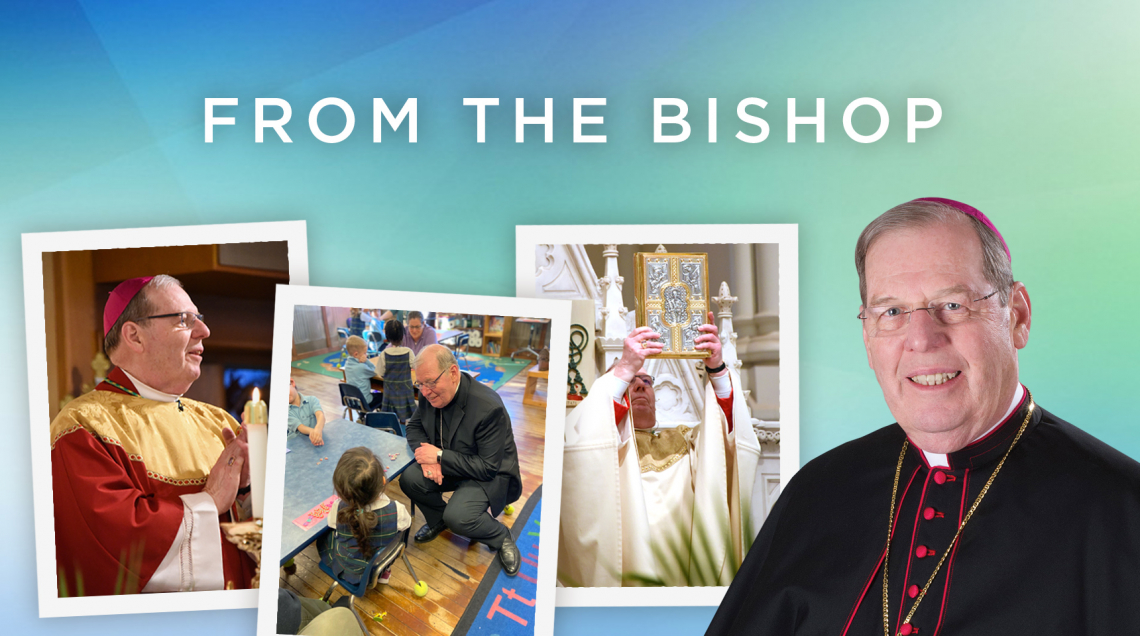From the Bishop - March 2022

Lent: A time to connect with one another
Lent leads to the celebration of baptism at Easter. Baptism is the gateway to membership in the community of believers who are the Church. Lent is the period of final preparation. The conversion of life, however, which is at the heart of preparation for the Easter sacraments (baptism, confirmation, and Eucharist) was not reserved for those who would receive them for the first time. It involved the whole community. Lent is an exercise of the Church. It is a time to reflect on Paul’s words, “Jesus is Lord,” and ask, what does this mean for me? What does this faith in Jesus ask of me? All the members of the Church are invited, along with those seeking membership, to deepen their commitment to Jesus and, through Him, to the community of the Church. Conversion and renewal through prayer, fasting and almsgiving are the actions of Lent.
Ultimately, the things we do for Lent connect us with one another. Our personal prayer and fasting move us into the charity of almsgiving, of caring for each other. We are a community, the Church. We worship God together in the Eucharist with confidence that, in this sacrificial action, Jesus is present with us and is leading us by the gift of His own life to offer our lives to God. Such an offering immediately involves us in caring for one another. As Pope Francis teaches us, “Our worship becomes pleasing to God when we devote ourselves to living generously and allow God’s gift, granted in prayer, to be shown in our concern for our brothers and sisters.” (Gaudete et Exsultate 104) Speaking of others as brothers and sisters shows our conviction that each of us has value, each of us is loved by God, each of us is deserving of respect and dignity. In another place, Pope Francis reminds us that this is the love we have for each other. “Our love for others, for who they are, moves us to seek the best for their lives. Only by cultivating this way of relating to one another will we make possible a social friendship that excludes no one and a fraternity that is open to all” (Fratelli Tutti 94).
We are now two years into living in a time of pandemic. We come to this Lent a people who need to acknowledge that this time has changed us. We are living more as individuals. The idea of gathering in community has become a health challenge. It is certainly important to keep ourselves safe and healthy, but it is also important to realize that we need each other. And we need to be careful that we are not isolating ourselves in such a way that we lose our sense of community. Being social beings is an essential part of our humanity. Thus, I suggest that this Lent we try to be conscious of the opportunities we have to relate to each other. As well, we might think of how we relate to each other in these times where there is great division in our culture. Appreciative of the value of each human person, how do we as Christians and followers of Jesus live that truth in our daily lives?
I want to offer two thoughts for Lent. First, I think it important to speak of the place where we truly celebrate our community and are united with Jesus in a sacramental way – Eucharist, the Mass. Because we are being careful about gathering in person, many people have not returned to Mass. Some continue to follow it virtually. Some are waiting for an end to the pandemic. In all of this, I worry about our young people. We are people who learn through following habits and patterns. When other things take over the time reserved for Sunday Mass, where will the young nurture their faith? Pope Francis places great faith in the role of the family in the Church. “Families are the first place where the values of love and fraternity, togetherness and sharing, concern and care for others are lived out and handed on” (Fratelli Tutti 114). He calls the family “the privileged milieu for transmitting the faith.” Perhaps this could provide a Lenten activity for families. How do we connect with our parish family to celebrate Sunday? Whether online or in person, include this most important prayer, the Mass, in your schedule.
Another thing we might do in Lent to connect us to others would be to acknowledge that social media, though helpful in many ways, can contribute to the coarsening of our civil discourse. Francis reminds us that “digital relationships, which do not demand the slow and gradual cultivation of friendships, have the appearance of sociability,” but they do not really build community. They actually expand the individualism that can divide humanity (Fratelli Tutti 43). In digital communication, Francis sees that the limits of civil discourse, respectful of persons, can be overstepped. “Defamation and slander can become commonplace, and all ethical standards and respect for the good name of others can be abandoned” (Gaudete et Exsultate 115). Lent would be a good time to monitor how we are using social media. Does it bring us closer to one another or separate us?
Prayer, fasting, and almsgiving. These are the actions of Lent. They connect us in community and faith. May these days be a time of renewal of the connection that makes us Church.










